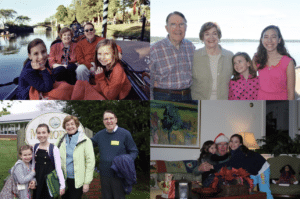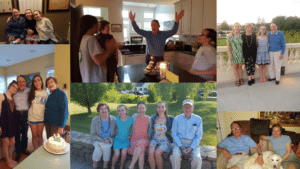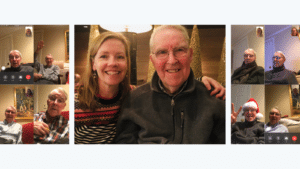By Meghan McCarthy
Editor’s Note: In light of the 2024 PennAITech Symposium, this article is a part of ongoing coverage on the intersection of technology and dementia.
I was in sixth grade when my family moved to Pennsylvania. Born and raised in Massachusetts, the prospect of the move seemed alike to epic adventures I would read as a kid.
In the years that passed, living in the Keystone State became familiar. I grew to love Wawa and enjoyed a soft pretzel school snack. I identified New England versus Pennsylvania vernacular, such as ‘bubbler’ versus ‘water fountain’ and ‘sub’ versus ‘hoagie.’ My family binged the Rocky movies and ran up the iconic steps together in Philly.
While being away from home was hard, we made regular trips back home to visit my grandparents. Lovingly called ‘Ammi and Appy’ by their grandchildren, they are the heart of my family.
Making the trek to visit them became a beloved monthly trip. Then COVID hit. Suddenly, our route home was blocked by a global pandemic.
It was then that my family became reliant on technology.
A content theme turned personal
For months, I have worked on content centered on the theme of technology and dementia. Working with researchers, patients, and caregivers alike, I have been privileged to share many stories of families who harness the power of technology to support loved ones with Alzheimer’s disease and related dementias (ADRDs).
Ranging from algorithmic models that can predict mild cognitive impairment (MCI) to robust home monitoring and caregiving systems, these stories have been elaborate. And while incredibly impressive, I wanted to end our coverage with the message that integrating technology doesn’t have to be complex.
For my own family, the simplicity of a nightly FaceTime became an essential ritual for maintaining connection.
Seeking connection during the pandemic
My grandfather, Appy, first developed signs of dementia before I was born although he was never formally diagnosed with Alzheimer’s disease (AD). When we first moved to Pennsylvania, his symptoms were mild enough that he and Ammi visited each season.
By the time the pandemic hit, he had a full-time caregiver and preferred spending his days at home. Dementia took away his short-term memory, but my grandfather never lost his loving nature or family memories. Known for his generosity, integrity, and witty sense of humor, anyone who met Appy would agree he was an absolute delight.
At the beginning of COVID, we didn’t want to expose my grandparents or risk our own family’s exposure through travel. Since our move, it was the first time we felt truly separated from Ammi and Appy.
The emotions were a tidal wave of grief, loss, and sadness.
“It was heartbreaking,” my mom said. “I immediately sensed that we were losing precious time, specifically with my dad, that we would never get back.”
When the pandemic began, Appy’s live-in caregiver left and a local family member took their place. Having easier and casual access through a family member’s care opened up a whole new realm of options for connecting with Appy. Before the pandemic, my mom called her parents daily but would only occasionally FaceTime them. With the reliability of a family caregiver, she hoped a daily FaceTime would be feasible.
Trying but without expectation, FaceTime exceeded her greatest hope for maintaining connection with Appy.
“Seeing each other on FaceTime became part of our routine,” my mom said. “I knew it meant a lot to my dad because of his enthusiasm to join the call. Our calls became the most special part of my days.”
A new nightly routine
In 2020, I was a freshman at Villanova University. As the pandemic started, all students were sent home for the remaining of the semester.
My days were filled with Zoom class and studying, but at the end of each day, I would smile at the sound of my mom and Appy laughing and talking. Their discussions became a sweet melody signaling that another day in the strange life we were living had passed.
Almost every call began with Appy jokingly asking, ‘Emilie [mom], is that you?’
Dementia never took Appy’s humor and generosity of love. While casual in nature, my mom was intentional about what she brought up with her dad.
“Sometimes, I’d give him a scenario that was a familiar and repeated task and ask ‘what do you think, Dad?’ He’d have a response because I would ask about a task he did prior to his dementia,” my mom said. “Other times, he’d just talk freely about any topic in the past, present, or future. It was a space for him to talk freely and have a clear flow of expression and support.”
Even in moments of confusion, my mom didn’t correct or negate Appy in conversation. Instead, she focused on having continued conversation that made him comfortable and interested.
Topics ranged from reminiscing about childhood memories to practical questions about tasks such as shoveling snow or mowing the lawn.
In some, our family pets would also make an appearance. The line ‘Oh, what a dear, dear kitty,’ and ‘do I hear a cat?’ is etched in my memory. In all, love and laughter were at the heart of each conversation.
FaceTime truly became a lifeline for my family’s connection.
For Appy, mornings were harder physically. As his dementia progressed and he lost mobility, slow mornings were against his early-riser nature. The nights, on the other hand, were riddled with increased anxiety and confusion. Where were his parents? Where was he living? The stream of thoughts clouded his mindset, and his daily FaceTimes provided routine, trustworthy conversation, and joy.
“I think darkness can bring out angst and aloneness more than mornings for many people,” my mom said. “Our calls were a nice break from caregiving for our Massachusetts family, and was a time for me to fill him with comfort and love.”
One night, I vividly remember coming downstairs to the sound of classical music from my mom’s phone. Looking at the screen, I realized Appy was watching one of his favorite performances and wanted my mom to listen in.
“Both of my parents have such an appreciation for the arts and specifically music,” my mom said. “Music really moved him. Whenever we went to church, he always sang the hymns. Listening to music together was a form of worship for Dad.”
With the camera turned towards him, my heart melted as I saw him mimicking the conductor while occasionally looking to my mom on the phone.
It was a small moment. But, in a world filled with distance, uncertainty, and sadness, it was small moments like this that meant everything.
Meaningful reflection
The number of FaceTimes my mom had with Appy during the pandemic.
Did the FaceTimes replace in-person time together? No. But my family will forever cherish the memories of those FaceTimes.
“For the rest of my life, those conversations will be bottled in my heart… each and every one,” my mom said. “They brought us together, and always ended with ‘I love you very, very, very, very much.’”
This article is dedicated to my grandfather, William Irving MacDonald, whom I love and miss dearly. To learn more about his wonderful life and legacy, please click here.




